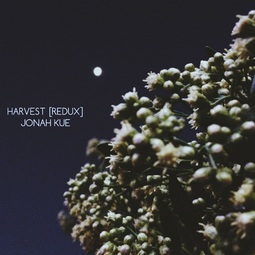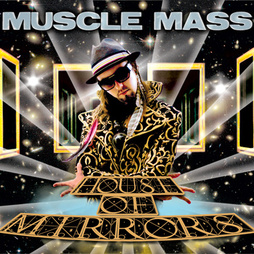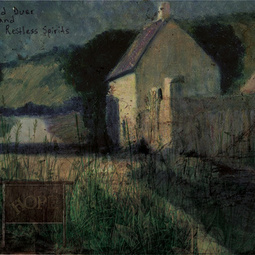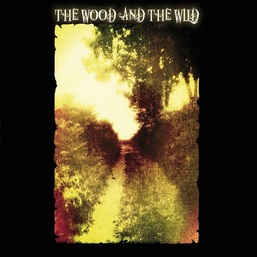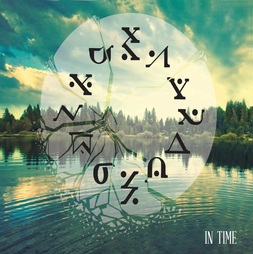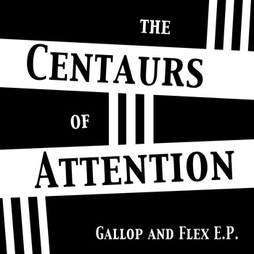|
Jonah Kue impressed me last year with his release Road To Market. His silky R&B style mixed with electronica and melancholy was a genre explored by few other contemporaries (the most direct comparison is How To Dress Well although you could also reference The Junior Boys). Kue has managed to create a strong follow-up called Harvest Redux, which contains 19 songs that continue to explore within the outer limits of R&B. Kue’s voice is about as smooth as they come and is the focal center that can sometimes cause you to overlook the production which is crisp, usually inventive and occasionally cinematic. There is a lot to digest here but it’s well worth the effort. Kue doesn't deviate much from his style but the songwriting and production is good enough to keep you engaged. The album starts with a multi-layered accapella-style song that implements slight auto-tune as well as delay called “Harvest of Ages.” It’s a very effective introduction as it seamlessly segues into “Dreamers and Architects.” Kue quickly creates a canvas of smooth lava-like warmth with pads, bells and even a vocal sample. The song quickly establishes that Kue is in the zone as the vocal melody is on point and is something you can imagine dancing to at the hippest lounge in the city. On “Sleepless” Kue creates a subtle upbeat energy as if you just chased down the Xanax you took with a Red Bull. He also implements creative orchestration that brings a lot of diversity to the song. “The Enemy” lays down a heavy beat but is carried by a very good vocal performance while “Belong” shows Kue experimenting a bit more with atmosphere and layering. It’s hard to choose and really unnecessary to pick a highlight amongst the batch but “S.a.S.” and “Vicious” are two you are not going to want to miss. Harvest Redux is the type of album you can just hit play and not worry about it. Kue has put in the effort and it shows, as the album while on the lengthier side really doesn't have major lulls. His production is varied and very slick throughout but really wouldn't matter if he didn't have the songwriting chops. Good songwriting, good production, good album.
0 Comments
L.A. life was good to Natalie Madison, Samson SunEyes and Rafael Michael, who all grew up on the golden coast, three souls privileged musically, geographically, and soon to meet for what would be a catalyst on their industry journey. They all collaborated on a Hollywood movie soundtrack and from what they heard and experienced between themselves during recording sessions, they knew it was meant to be. The three musicians formed Muscle Mass in 2010. Their debut album, House Of Mirrors, is a showcase of musical motifs that strike the most strongly toward a post rock/dance vibe. These individuals are interesting creatures, full of different styles of writing and concept framing. “Savior” carries a warbling eerie synth that creates tension and pressure, never ceasing. Natalie’s vocals mimic the strange quality of sound, straying from open vowels and grabbing hard consonants. It’s a creepy fun song that explores longing and delusion. My favorite on the album by far is “Know Your Limits.” It exudes this strength and assurance not unlike a movie theme would. The melody sits nicely in melodic minor scale before wandering into an esoteric idea that loses control and returns back to the introductory progression. It’s a sexy ride full of the slick and strange. “I Want More” sounds the campiest, but it’s a strong effort. The opening lines pose questions about dogs, heaven and monkey brains. So there’s that. This track reminds me of Garbage’s “Special” with the soothing chorus and all- around polished edge. Muscle Mass just had to end the album on a weird note. Unsettling calliope open “R gods” soon joined by distortedly low vocals that sound like a demented carnival host. There’s a brief passage of song where Madison sweetly breathes cool tones amidst airy chords, but it’s pretty much over before it begins. In a limited lens, Muscle Mass might not make the cut. Listeners need to open their minds to new kinds of composition, not like the formula we’re trained to anticipate. When I use words like weird or strange, it’s synonymous with refreshing and new. These aren’t to be assumed at all negatively, but rather to draw attention to the unfamiliar because that’s where we progress as musicians. Taking what’s odd at first, and somehow making it commonplace.
All the way from the Emerald Isle, comes Keith Margo, a bold voice with British influence and great taste with his EP entitled Glitterbug. I’ve always considered the British to be distinguished pioneers of music and I’m not surprised to hear that Margo has his own appeal. Not to say that there aren’t signs of influence and we’ll get into them shortly.
I can’t help but hear a late 70’s ballad in the piano work of “A Beautiful Day To Die.” It holds the focus of the song and presents the listener with a good dose of what’s to come. Margo utilizes the piano like Elton John with the lyricism of Lennon and the rich vocals of something between Billy Corgan and Paul McCartney. And if you’re sound likens to such artists you’re doing something right. The jangling of bells occasionally embellish the tune but nothing more. And you don’t even want more, the piano and voice alone suit the whole album. Again, retro moods issue out of the following tracks, especially on “Now I Only See Her In My Dreams.” Margo’s voice strains on the verge of a whine as he confesses losing the physical reality of love, cue song title. Gentle strings permeate beneath the comfortable combo of guitar and piano like a sermon of romance and regret. Glitterbug is strewn throughout with short interlude length capsules – “Beginning,” “Baby Lazer” and the aptly named “Ending” that introduces a high, soft twinkling with key selection far to the right. Personally, I feel it could have been further developed, but it’s a quick little treat nonetheless. “Beginning” has some very relatable lyrics – “Baby it’s cold and I want you to stay” has got to hit home for a lot of people. Whether you said it or thought it, it’s an applicable relationship paradigm. Margo has definitely arrived with this second album and I’m on the look out for more. His mixture of old and new is really something to behold. With every listen the songs grow more and more cohesive and you lose yourself in the simplicity. I’m not sure what Glitterbug means to the album, but I don’t know if I’m supposed to. Maybe you have the answer. Maybe there isn’t one. All I know is, it’s a fine EP. Bravo. Brad Duer said it best in his description of his album A Town Called Hope. “It's an album I wrote about struggling to hold on to a dead love." The Indiana native has put some tough times into an amazing collection of songs varied in style between sax-infused jazz rock, stripped ballads and funk. He’s been writing and performing since 2007 and I hope this work reaches the right people because I smell something good in the kitchen if you know what I mean. Duer’s vocals are nothing less than beautifully emo, but they come from a different place than the usual cry me a river stories. As the album unfolds, you see a side to this guy that sheds all the light necessary for artful heartache to take center stage. I think of Dashboard Confessional at times when hearing his delivery, melodic choices, and sense of harmony. It can’t be said enough, A Town Called Hope is full of pleasing blends and satisfying instrumentation. Resolves are spot on, solos are damn close, and it all makes sense. Focused intention is such an underrated premise for albums. I appreciate it when artists make a claim with sound, unified in tone and message. That’s what we have here and it deserves some applause. “Boy, I Feel Alive” is a romp-y bar jam with shades of alternative and indie. The treble gets a downslide in the beginning, but kicks it up before the verse breaks. Not quite as long as Fastball’s “The Way.” Still surprised Fastball got away with dragging that tinniness as long as they did and still landed a hit. There is a somewhat oddly met rhythm change midway through Duer’s song, but once it takes hold it changes the shape of the song and deepens the mood for the listener. I’d say no harm no foul. The first real painful setting comes forth on “Tuesday Nights.” It’s not as intimate as Duer is capable of, but he’s holding back yet, the album is still young. The snare flutters and the clave clicks atmospherically as cymbals wash into the stormy waters of a raging heart, fighting alongside conflicting relationships – to end it, to love in vain, to lose respect, to find new love. That is the stuff of songwriting gold. Duer puts his hip-hop admiration to use on “Night After Night.” The rapping is intelligent and that upper harmony in the chorus grabs the ear like a confident lover and leaves you wanting more. Almost as much as the keyboard line, an attractively composed hook built to haunt and yet excite. Now, there are songs that you can tell are going to be good within a few seconds and “Recluse” fits the bill. My expectations were beyond met, that acoustic outlining, the bass stinging up and down with high register sadness, percussion spare but perfect. This song benefits so much from the freedom of instrumentation, less Duer the better really. He sets the mood and the music pulls the heartstrings. But, Duer knew better than to close on a downer, so “Shame On Us Both” comes along and snaps you back into sunshine and some good vibes. The sax is back and slinging some soulful lines over bright funk. It’s a great closer and shows us that moving on can be the best policy. The Wood and The Wild is a band led by Jon Perry that you just have to listen to appreciate. On their self-titled album The Wood and The Wild there is a timeless quality that is anchored in traditional folk music. I sensed influences from sources like Donovan, The Beatles, Tame Impala and even Fleet Foxes. Perry describes the music as cinematic folk, which fits. The music is largely organic-based and played on acoustic instrumentation but it contains swells of strings, strategically placed and processed reverb heavy vocals, and a numbers of other elements that create a sense of space and atmosphere. It doesn't hurt either that Perry has a delightful voice (sounding a bit like Lennon at times) that is tailor-made for folk. He has a good delivery as well as lyrics that feel inventive and free of clichés. “Loveless Traveler / Belles On The Tye” doesn't waste any time getting to the good parts as Perry sings “yeah its a long long road I know.” Soon to follow are almost ominous sounding synths that create a thematic presence to the song. The song goes places you wouldn't expect a folk song to go and is all the better for it is quite impressive how Perry seamlessly transitions from cinematic swells to sparse folk. Perry is just getting started as “Suffering Maid” combines very nice sounding vocal harmonies, drums and guitars. The exceptional parts are the transitions he attempts and pulls off. The song goes from a clapping percussive breakdown with vocals to an ominous sounding fog of string and back into the verse of song – all within about the span of a minute. Perry continues to impress as “Wheels” takes advantage of manipulating vocals with lo-pass filters and other times coating them with hall-like reverbs while “Long Days” solidifies the meaning of cinematic folk. The album ends with a piano ballad that is truly a beautiful song. It starts off simply enough with piano and vocals, which would have been great but this is cinematic folk. Perry adds ambient strings as well as synths to create a angelic atmosphere. I like a lot of artists that come through “The Equal Ground” but Perry is in the upper echelon. The guy has some serious skill and basically created a genre. Give this man some love and check out The Wood and the Wild. Burning Down The Villager is a four-piece from Lincoln, Nebraska that play straightforward accessible rock that is well written and will resonate with a large audience. Fans of bands like Weezer, Muse, Kings Of The Stone Age and The Foo Fighters will embrace their recent album In Time that was released on Tremulant Records. This a band that takes minimal effort to enjoy. It’s unpretentious rock with a fair amount of catchy melodies, enough variation to keep you engaged and you get the feeling these guys had a blast while making this record. The production is very good throughout and has the sound of professional recording not a sloppy put together DIY effort, which makes the songs that much more enjoyable. The album starts strong with “Oceans,” which throws jagged riffs, vocal harmonies, and powerful drumming in your direction. Grady McGuire has a pretty decent rock voice, which isn't too pretty or aggressive. It lies somewhere in between and fits the music. The songs ends with a concoction of layered vocals and rocking guitar while McGuire sings “I can’t even comprehend.” “Catch My Breath” is a great follow-up to the first song as they showcase that they don’t need distortion to make a lot of noise. The verse contains impressive, cascading guitar melodies before they rock out on the chorus. The band likes to end with a bang as they implement a similar fourth act in the first two songs. “What You Did” was one of the highlights for me and contains some shredding guitar towards the end of the song that kicked some serious ass. “Bad Memory Boy” was certified power pop and reminded me of a classic Weezer while “Crude” was a nice deviation that proved they didn't have to rock out on every song to make you appreciate them. In Time isn't breaking any barriers but it does provide a number of songs that make Burning Down The Villager a formidable force in indie rock. The album has a good flow and provides enough variation that listening to it was a pleasure.
Before I even listened to the self-titled EP Ownership by Ownership I had a feeling I was going to dig it. Why? Well for one they decided they would have a picture of the world's largest and most powerful particle collider, which recently discovered the Higgs Boson for their album cover. I was happy to realize that they were the type of band who is willing to have a party inside the hadron collider. On their first track entitled “Speakeasy” they tip their hats to bands like LCD Soundsystem and Hot Chip with a dance vibe that utilizes distorted funky bass and prominent drums while at the same time surrounding the music with airy, atmospheric synths that give the music a celestial quality. The vocals are good but sparse as the singer picks and chooses when he wants to sing. Even though the song is void of a catchy, discernable chorus it rides a mysterious dance wave that had me engaged. The second song “Assistants” is a different beast. The dance worthy energetic vibe is gone for the first half of the song and is replaced with a hazy, psychedelic fog that works just as well for the group. I enjoyed the angelic overtones of ecstasy they implemented into the music. Cole Berggren delivers an inspired vocal performance. He sings; “Will You... Continue... To Let Us Suckle And Feed? Oh… Assistants With No… Assistance The Ticking Tock Of The Click And Clock Wakes Me Up As I Need To Be.” I was happily surprised by the thick, heavy beat they introduce in the last minute of the song. It got my head groovin’ to a very good groove. “Paths” is the last song on the EP and showed that the band could create an emotional connection to the listener while making them dance. The drums keep you dancing but the cloud- like synths produce a sense of nostalgia and warmth. Berggren’s vocal performance also feels more heartfelt on this track than the previous songs. The band strives for a glorious, cinematic ending channeling comparisons to M83 as well as The War on Drugs. This EP is a good introduction to the band. I really like what I heard and hope to hear a full-length album soon.
I was to understand there’d be musical ambiguity when listening to The Centaurs of Attentions’ EP Gallop and Flex. Already intrigued by the creative band name, and feeling challenged by the idea that I couldn’t firmly categorize this band’s sound, I dove right in. I got a few moments into the wonderfully complex “Slings and Arrows,” and I would have thrown a white flag if I didn’t enjoy the sound so much. There’s some really nice piano going, some choir sounds – is that a tambourine – and a jam session that just explodes with sound. I don’t think I was supposed to start laughing at the beginning of “Lament” (the slow down made me feel even more guilty about it, thanks) but I couldn’t help it; it was so surprisingly bubbly even though the subject matter was quite serious. There are some really nice vocals here, and the chorus is incredibly catchy. This sounds like show tune meets heartbreak song, and it’s a very powerful combination. Any song that manages to mention huevos rancheros gets a plus in my book, and “San Diego” doesn’t take long to satisfy. It’s a very sweet toast to the city, with some rather correctly used terminology and humor all the way throughout. I’ve never been there, but if this depiction is true, I’d like to go visit right away. “Here Come The Cylons” sounds like it could be the intro song to a Saturday morning cartoon that I would love to watch. I can just see vivid illustrations morphing and changing shape and bravely standing up to whatever forces rise up to meet them, based mainly on the imagery painted by the piano and vocals with a nice taste of special sounds to spice things up. Okay – Centaurs of Attention wins. There is no possible way to package their sound into one category of music, and to do so would really be blasphemy. This was a fun listen all the way through, however, and is more than worthy of checking out. I hear their live shows are equally, if not more, impactful; so if they’re playing in your town, give them a glance, and be sure to let me know if you think they’re as boisterous and unique as I’ve found them to be!
One thing I can say about Gloomy Gus is that this solo project doesn’t sound like anything else out there. His recent EP Do Me Like a Rail doesn't come off as something that is accessible but it has a raw, visceral quality as if Gloomy Gus can't but help but make anything but this music. As you listen to this EP it’s obvious that this IS the music he wants to make and it is coming from a very real place. He doesn't have a great voice and you won't find him winning any singing competitions but he sings his heart out. His raspy vocal performance almost feels like an improvisation as he sometimes slurs his words, goes a couple of octaves too low and overemphasizes words. The album opens up with “I Loved Her Like A Comet,” which begins with a reverb-laced guitar and vocals. As the song progresses it introduces percussive elements, shards of white noise and more guitar creating an original concoction of noise. The song is solid and reasonably catchy. “Do me Like a Rail” showcases Gloomy Gus’ dynamic range. When he starts singing in a very low octave it has a comedic quality that is endearing and works with the music. It is very similar in the way Ariel Pink sometimes makes you laugh. On top of the distorted guitars he implements a subtle electronic beat. “Nostalgia” contains a bit less energy than the first two tracks. Gloomy Gus goes melancholy and attempts to deliver an emotional performance by using a field recording of rain playing alongside his music. The EP closes with “Began In An Airplane” where he breaks out the acoustic and delivers one of his cleanest performances. Gloomy Gus has a unique sound and I have a feeling that people will either love or hate his songs and vocal style. Take a listen for yourself and see what you think. Michael Stec has been playing music since he was four-years old; so it’s really no surprise that his self-titled EP The Michael Stec came packaged with healthy guitar chords and riffs, some piano flavor and a seasoned voice to deliver an expressive, emotive effort. With four songs (three of which are described below) and a run time of under 20 minutes, everyone has the time to give this a listen. I love the opening piano chords in “Soap Opera Romance.” Stec has a voice that sounds like a gruffy version of Phil Collins’ or Michael Bolton’s voice. There’s a little bit of everything in this song, but the piano is really what stands out most. The hook is very catchy. “Little Boat” has a really nice plucky tune, with smooth vocals and rather meaningful lyrics. The simplistic nature of the acoustic guitar and vocals alone gives the song a really nice sound; it isn’t overbearing or too busy. “Secret” begins by meandering sweetly, with the guitar softly playing under equally soft vocals. I like how the song picks up, with some background vocals to add depth. This is another one with nice meaningful lyrics. The Michael Stec EP has some real strong points: namely, the uniqueness of his voice, and the finely adapted guitar chords that perfectly complement the meaning and overall sound of each song. What I noticed was “Soap Opera Romance” seemed to stand farthest from the rest; “Window” and “Little Boat” could have likely been combined into two phases of the same song. That said, I did like the overall sound of this album, and really want to hear more from Michael Stec. I hope to hear a full-length soon. |
Critique/insightWe are dedicated to informing the public about the different types of independent music that is available for your listening pleasure as well as giving the artist a professional critique from a seasoned music geek. We critique a wide variety of niche genres like experimental, IDM, electronic, ambient, shoegaze and much more.
Are you one of our faithful visitors who enjoys our website? Like us on Facebook
Archives
July 2024
|

